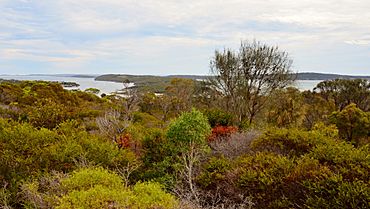Kellidie Bay Conservation Park facts for kids
Quick facts for kids Kellidie Bay Conservation ParkCoffin Bay, Kellidie Bay & Wangary, South Australia |
|
|---|---|
|
IUCN Category Ia (Strict Nature Reserve)
|
|
 |
|
| Nearest town or city | Coffin Bay |
| Established | 30 September 1958 |
| Area | 17.84 km2 (6.9 sq mi) |
| Managing authorities | Department for Environment and Water |
| See also | Protected areas of South Australia |
Kellidie Bay Conservation Park is a special protected area in the Australian state of South Australia. It is located on the west coast of the Eyre Peninsula. You can find it right next to the town of Coffin Bay and the beautiful Kellidie Bay. This park helps protect important wildlife and natural features.
History of the Park
The park was first set aside to protect nature and wildlife way back in 1954. It officially became the Kellidie Bay National Park on November 9, 1967. Later, on April 27, 1972, its name changed to Kellidie Bay Conservation Park. This happened when a new law called the National Parks and Wildlife Act 1972 was introduced. As of 2016, the park covers an area of about 17.84 square kilometers.
Plants and Animals in the Park
The park has low limestone ridges covered with certain types of trees. You can find black tea trees (Melaleuca lanceolata) and she-oak trees (Casuarina stricta) here. Near the coast, there are flat, moist areas with lots of cutting grass (Gahnia species).
Many animals live in Kellidie Bay Conservation Park. Western grey kangaroos and emus often hide in the higher parts of the park. They come down to the lower, flat areas to find food. You might also spot Tiger snakes and Cape Barren geese living in this area.
Why This Park is Special
Kellidie Bay Conservation Park is very important for protecting nature. It saves a good example of the Casuarina stricta and Melaleuca lanceolata woodlands. It also protects the Gahnia species herbland, which is a type of grassy area.
This park is also a very pretty place to visit and is popular with tourists. It is home to some less common birds, like the white-bellied sea-eagle and the osprey. The park is listed as an IUCN Category Ia protected area. This means it is a strict nature reserve, managed mainly for scientific research or wilderness protection.


